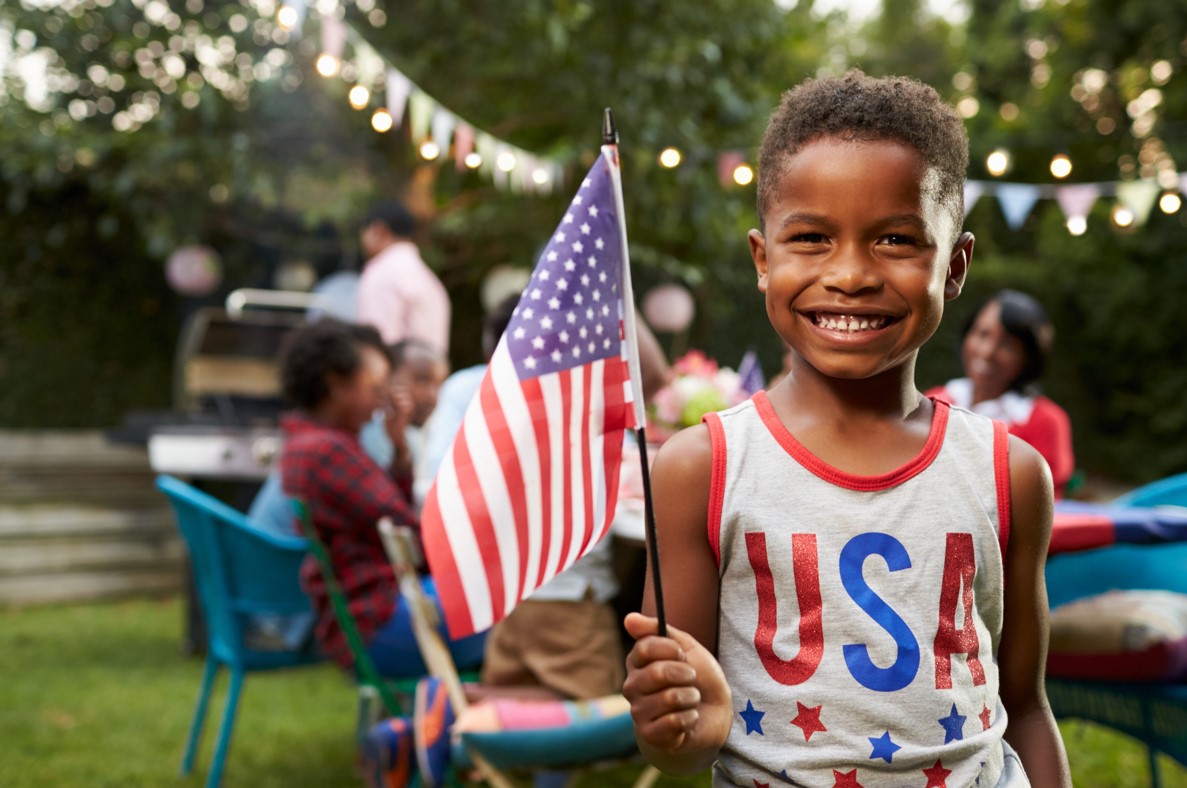
Reimagine Black Youth Mental Health
- The Reimagine Black Youth Mental Health (RBYMH) initiative aims to improve the mental health and wellbeing of Black youth and families in Minnesota. View or download:
- Black joy, uninterrupted: A review of the literature, prepared by Alexis Briggs for Rainbow Research
Goals
The goals
- Lead a holistic approach to improving overall mental health and wellbeing.
- Focus on Black joy: Shift the narrative from deficit to wellbeing. This honors the diversity of the Black experience and celebrates Black identity and cultures.
- Strengthen the ecosystem: Create environments for Black youth to thrive, increasing resources and connections for organizations, families and communities.
- Change the conditions that perpetuate harm: Change policies across community settings to address collective harms, using a health in all policies approach to mental health.
- Model community-driven change: Facilitate an authentic Black youth and community-led policy change process that models effective ways for Black youth to create change.
The approach
The Minnesota Department of Health (MDH) partnered with the Brooklyn Bridge Alliance for Youth (BBAY) to establish a new process for working with communities. BBAY is a joint-powers board between the Cities of Brooklyn Center and Brooklyn Park, Hennepin County, the school districts of Osseo, Brooklyn Center, Robbinsdale and Anoka-Hennepin, and the two community colleges of Hennepin Technical College and North Hennepin Community College.
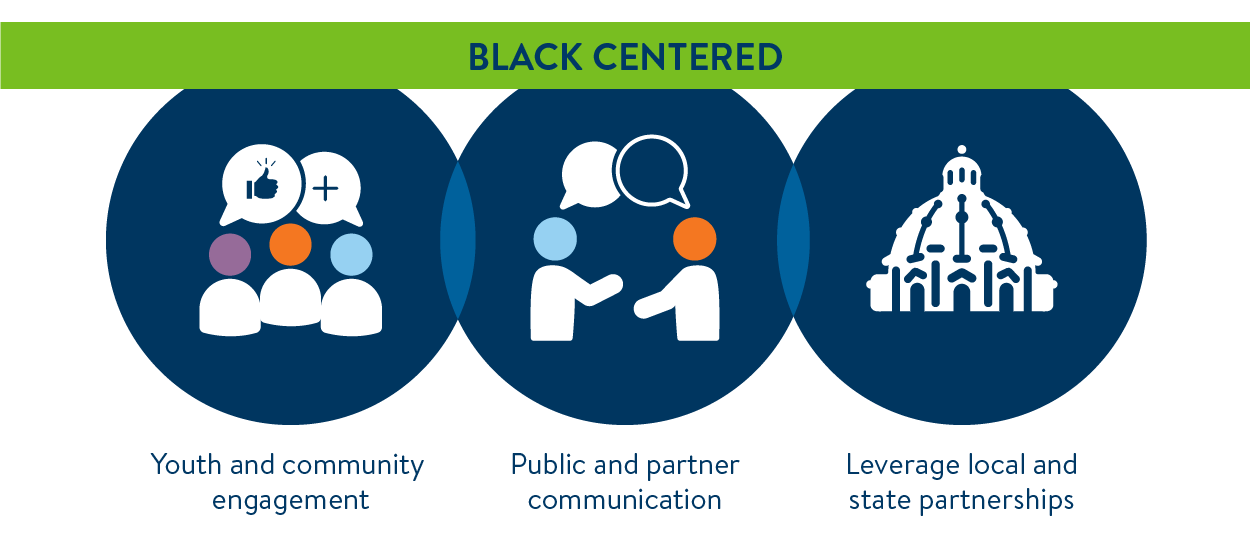
The Advisory Council’s approach:
- What we can imagine determines what we achieve.
- We won’t ignore trauma, grief, stress, other aspects of unwellness -- especially as it is situated in the context of systemic and interpersonal racism.
- We will simultaneously illuminate health - what is good and working in Black lives, what gives hope and life, what must be acknowledged and watered.
- There is already greatness in all people and communities.
- Finding and studying that greatness can offer one pathway to solutions.
- Stories are a key source of insight.
The Black youth affinity space and their experiences with sharing Black Joy and identity is proving to be foundational for supporting young Black leaders as they define what mental health looks like and the crucial steps on the road to claiming positive, racial identity and mental wellbeing.
- What we ask determines what we find.
- What we find determines how we talk.
- How we talk determines what we can imagine.
Youth voices on Black joy:
- “Having choices.”
- “Being able to choose.”
- “Being seen and understood by people.”
- “Supporting others.”
- “Being a part of the team.”
- “Being free.”
- “Being comfortable.”
- “Black success.”
Reimagining in Minnesota
Mental wellbeing in Black youth
Mental wellbeing is about having fulfilling relationships, utilizing strengths, contributing to community and being resilient, which is the ability to bounce back after setbacks. Mental wellbeing is a core ingredient for success in school, work, health, and community life. Many components are encompassed in mental wellbeing, including ten from the Minnesota Student Survey conducted every three years. Based on the 2022 Minnesota Student Survey data, non-Hispanic Black, African, or African American students (hereafter referred to as Black youth) reported lower rates for mental wellbeing components compared to their non-Hispanic white peers. The largest disparities in mental wellbeing components by race and ethnicity include social integration, social competency, personal growth, empowerment, and family/peer relationships. For more information on mental wellbeing components, please reach out to learn more.
Table 1. Non-Hispanic Black youth are less likely to report all mental wellbeing components when compared to non-Hispanic white youth
| Statewide MSS Mental Wellbeing | Non-Hispanic Black | Non-Hispanic White | % Point Difference | All MN Youth |
|---|---|---|---|---|
| Family Relationships | 68% | 85% | 17% | 81% |
| Peer Relationships | 66% | 82% | 16% | 78% |
| Personal Growth | 56% | 69% | 13% | 65% |
| Social Integration | 46% | 65% | 19% | 59% |
| Educational Engagement | 58% | 58% | 0% | 58% |
| Student-Teacher Relationships | 40% | 48% | 8% | 46% |
| Empowerment | 36% | 48% | 12% | 44% |
| Social Competency | 32% | 46% | 14% | 41% |
| Community Relationships | 35% | 42% | 7% | 39% |
| Positive Identity | 27% | 31% | 4% | 28% |
Black youth in the Brooklyns
This community-driven process to Reimagine Black Youth Mental Health is in Brooklyn Park and Brooklyn Center, Minnesota. Collectively called the Brooklyns, Brooklyn Center and Brooklyn Park are the northwest suburbs of Minneapolis and are the two most diverse cities in the state. The total population in 2020 was 105,875, including 16,000 youth ages 10-19 years old. The combined population includes 51% BIPOC, including 27% Black (15% African American and 12% African). The four school districts that cover this area are Osseo Public Schools, Robbinsdale Public Schools, Brooklyn Center Public Schools, and Anoka-Hennepin Public Schools (see Figure 1).
Figures 1. Schools in Brooklyn Park and Brooklyn Center
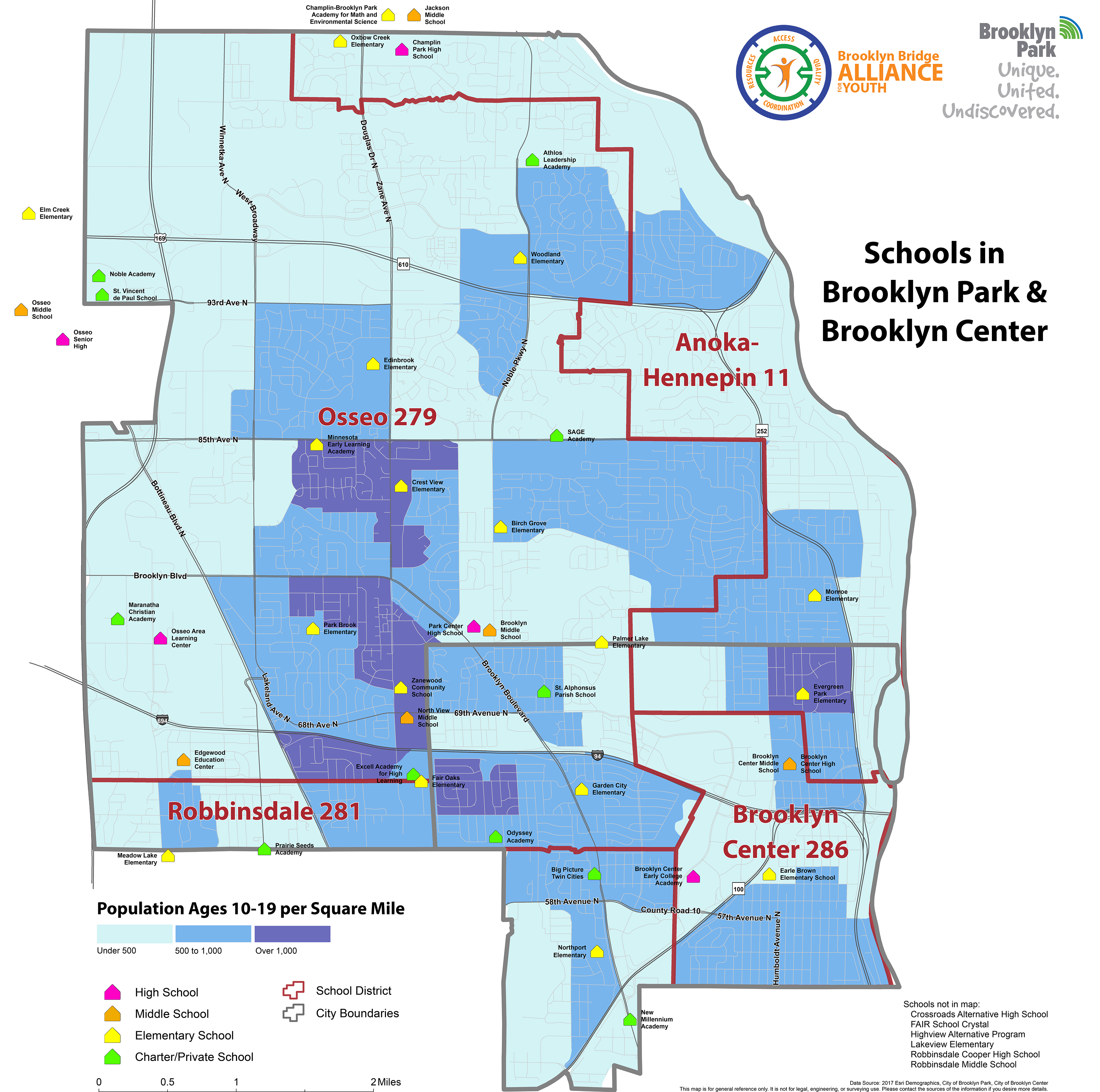
Brooklyn Center is the hometown of Daunte Wright, who was killed by Brooklyn Center police in April 2021, only eleven months after the police murder of George Floyd in neighboring Minneapolis.
All student reporting wellbeing components
Mental health has become a priority in nearly every county in Minnesota, according to the Community Health Assessment, and has been for many years.
- The share of community health boards that reported mental health as a priority health issue increased from 77% to 96% in 2020.
Mental wellbeing has been consistently decreasing since 2016 (see Figure X). Marginalized youth, such as those experiencing economic hardship, non-cis gender, LGBTQIA+, and youth of color, report lower levels of positive mental wellbeing. Positive identity has dropped more than 20 percentage points from 2016 to 2022.
Figure 2. All Positive Mental Wellbeing Components dropped from 2016 to 2019 and again from 2019 to 2022
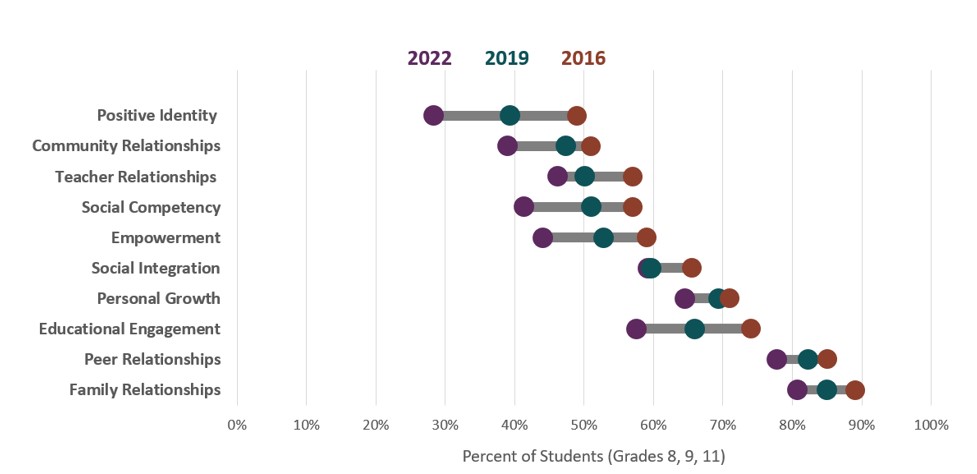
Data Source: Minnesota Student Survey, 2022
The more mental wellbeing components youth report, the better their health outcomes. One method to assess overall mental wellbeing, or whether Minnesota youth are thriving, is a simple cumulative score of the ten mental wellbeing components listed above. If youth report 8-10 mental wellbeing components, they are considered to have high positive mental wellbeing. There are differences among black youth in reporting high positive mental wellbeing.
Figure 3. High Positive Mental Wellbeing within Black Youth
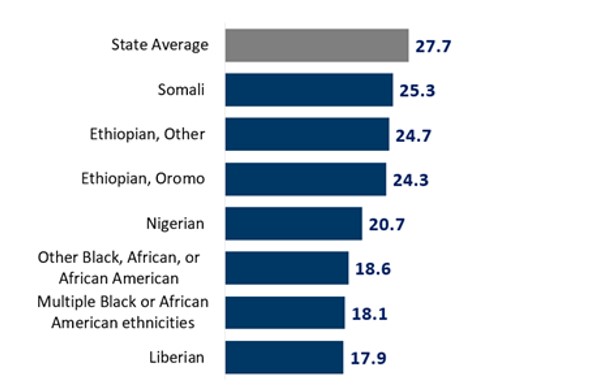
Data Source: Minnesota Student Survey, 2022
Youth voices on wellbeing
- Continuous engagement: An extended mobilizing phase that offers youth and families multiple opportunities to engage, build relationships, and explore this complex topic in a safe environment, is essential to get to the deep level of reflection needed.
- Safety: Youth space focused a lot on building safety to have meaningful discussions about mental health. This critically informed a safe, engaging, and transformational youth summit.
- Complexity: Mental health is a complex topic involving trauma, racial identity, history, and family history. Discussions must take place with care, patience, and humility.
- Representation matters: There must be broad representation in participants and leadership from across the diaspora because the Black experience is diverse.
- Mobilizing youth leadership: Active engagement of youth to inform and shape the community process is foundational.
- Sharing power is a practice: Implementing power sharing in day-to-day operations can be challenging despite sharing this core value. It requires ongoing efforts to build trust, navigate relationships and decision making, outline roles and set boundaries between leadership bodies.
Building community capacity and state/local partnership
Advisory Council
The Advisory Council was cultivated through individual stakeholder meetings, an initial public meeting with potential local system partners, and development of a draft charter; the council launches formally in January 2023. The council is comprised of individuals at various levels of leadership from the Hennepin County Public Health Department, City of Brooklyn Park, City of Brooklyn Center, Osseo Area schools, Brooklyn Center Community Schools, Anoka-Hennepin Schools, Robbinsdale Schools, North Hennepin Community College and Hennepin Technical College, and a range of community organizations including African Career Education & Resources, and InTentions.
The Council also includes other key decisionmakers in the Black community such as parents, pastors, and educators. They have spent most of the first year of this project building deep and wide relationships within the community to develop trust and respect in the community. Building community trust was an ESSENTIAL component of this project with the Black communities in Brooklyn Park and Brooklyn Center. In the second year they were instrumental in the planning and facilitation of research visits as well as providing consultation in the design of the demonstration project.
Black youth affinity space
Although Black youth are actively participating in leadership spaces throughout this project, it became quickly apparent that it was essential and valuable for Black youth to have their own space. The Black Youth Space was launched in Spring 2022 to build community, explore identity and culture, and better understand mental health and wellbeing. The group meets every two weeks to build trust, relationships and shared experience with other Black people, and explore wellness. This youth space is critical for mobilizing and engaging Black youth who are taking on leadership roles in this initiative. One of the significant findings in this project was the need for this Black youth affinity space for young people to feel safe and heard.
State Resource Team
The State Resource teams provides the infrastructure to implement policies and practices that improve outcomes for Black youth mental health. MDH has established partnerships across the state enterprise that can help leverage additional resources, contacts, and research to support effective policy implementation, amplify and promote effective policies from the demonstration project, and support sustainability by incorporating aspects of the process into existing programs and providing vehicles for systematically scaling the policy implementation in other community settings.
The State Resource Team (SRT) is led and convened by MDH and includes the BBAY coordinator. MDH staff conducted 25 individual 1:1’s with various state partners to begin orientating them to the State Resource Team.
- Governor Walz’s Children’s Cabinet
- State Health Improvement Partnership (SHIP)
- Regional Equity Coordinators
- Suicide Prevention
- Minnesota School Based Health Centers (SBHC)
- Minnesota Department of Education
- Minnesota Office of Higher Education
- Minnesota Department of Human Services
- Center for Health Equity
- Minnesota Department of Public Safety
- Minnesota Department of Natural Resources
- Minnesota Association of Children’s Mental Health
Project background
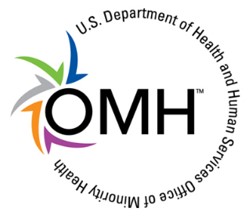
Emergency Task Force on Black Youth Suicide & Mental Health
The opportunity to support this initiative was launched in response to a report to congress from the Congressional Black Caucus regarding a growing crisis among Black youth. “The suicide death rate among Black youth has been found to be increasing faster than any other racial/ethnic group.” - from the Emergency Task Force on Black Youth Suicide and Mental Health Report. Recommendations included support for research and demonstration projects that focus on risk and protective factors for Black youth, among other priorities.
Health in all policies approach
Mental Health: a state of wellbeing in which the individual realizes his or her own abilities, can cope with the normal stresses of life, can work productively and fruitfully, and is able to make a contribution to his or her community. – World Health Organization
The health in all policies approach leverages the relationships between positive mental health and the many social factors that impact mental health, from education, parks, public recreation, to policing and more. These policy areas impact our health and mental health whether we are conscious of them or not. Ensuring policies enhance our mental wellbeing and elevate human dignity, respect, and growth; Black youth will have opportunities to better contribute to society and develop in a positive and healthy way. Policies that invest in the economic, social, and political environments will contribute to overall increased wellbeing for all.
Through this lens, the Advisory Council, in partnership with Black youth in the community, will identify and implement specific policies at the local level that are expected to have the greatest impact on BYMH. Under the leadership of the Advisory Council, the community will develop a process to engage Black Youth in identifying a range of policies that play a role in improving BYMH.
Initiative goals
The Reimagine Black Youth Mental Health Initiative has three goals:
- Improve Black youth mental health.
- Design a process that includes Black youth and communities in policy development.
- Implement a ‘mental health in all policies’ approach.
Historical context
Mental wellbeing and racial justice
Mental wellbeing requires a sense of purpose and self-determination. To truly experience mental wellbeing, Black youth need to feel and have the power to shape their world and change their lives and conditions for the better. For many, historical trauma is a reality that disrupts a sense of purpose and power and continues to be part of lived experience and reality.
Systematic racism and generational structural inequities (social, economic, political, and environmental) result in poor health outcomes. These inequities have a greater influence on health outcomes than individual choices or one’s ability to access health care, and not all communities are impacted the same way. All people living in Minnesota when health disparities are reduced and racial equity is advanced.
Defeating the myths of racism and colorism
Understanding the context of racism. Common beliefs are embedded into the cultural knowledge of many communities. Many of these pernicious and harmful myths are designed to instill fear and distrust, while contradicting the reality for diverse communities.
Throughout this project, community and system partners have reinforced that addressing systemic racism will not disrupt the market economy, will not harm white people, but can have a positive impact for all communities.
Improving Black youth mental health will help enhance civil liberties for all, increase economic prosperity for everyone, and contribute to the increase in overall wellbeing for everyone. The great irony of racist ideas and systemic racism in Minnesota and in the U.S., is that it continues to undermine the legitimacy of democracy, capitalism, law and order, and prosperity for all.
By greater engagement in the political process and economic systems, Black youth will strengthen the overall system and allow for increased opportunity for people of every culture and ethnicity.
Chronological activities and policies
As the State Resource Team started gathering, MDH highlighted the landscape of racial policies and the historical context that helped inform the process of identifying policies to improve Black youth mental health.
Reconstruction (1865-1877)
- South’s first state-funded public-school systems, more equitable taxation, laws against racial discrimination in public transport and accommodations and ambitious economic development programs.
- Civil Rights Act of 1875
Policies challenging racial groups (1877-1957)
- Electoral disenfranchisement
- Economic subjugation of Black People
Civil Rights Era (1957-present)
- Civil Rights Act 1957
- Civil Rights Act 1964
- Civil Rights Act of 1968
Local Policy History
- Interstate 94 - Rhondo community
- Earle Brown Heritage Center
- Racial covenants in housing, part of New Deal
- Recreation settings: Filling swimming holes with concrete
- Business Ownership in Minnesota in 2017
- White: 80% of population, 95% are white owned businesses
- Black: 6% of population, 1% are black owned businesses
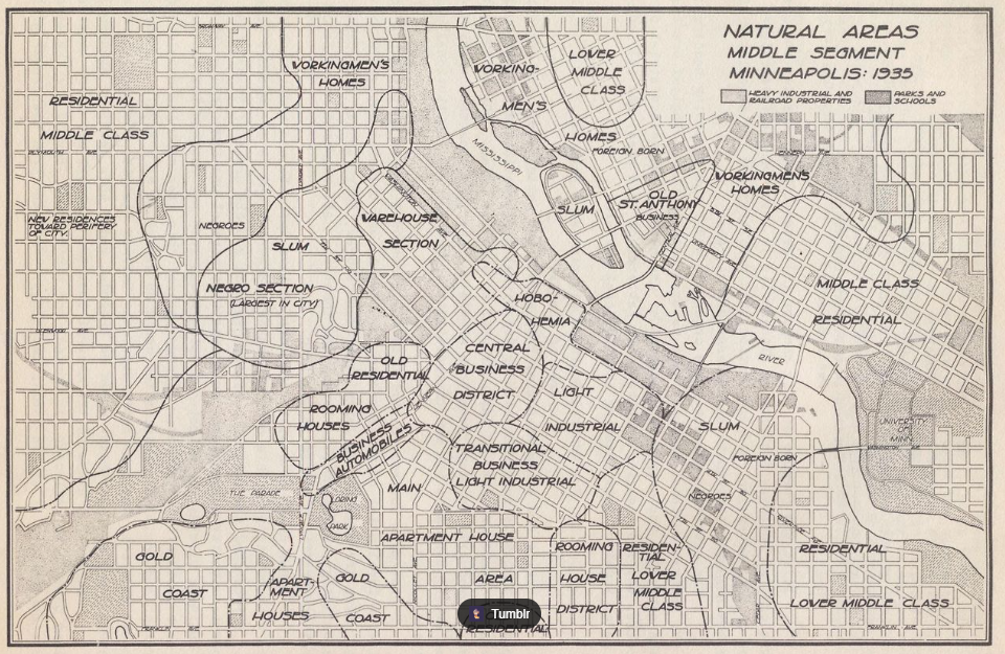
Initiative reports and resources
- Reimagine Black Youth Mental Health project summary (PDF)
- Black Joy Literature Review
- Reimagine Black Youth Mental Health Summit I- Recap Report
- Reimagine Black Youth Mental Health Summit II- Recap Report
- BBAY Update to State Resource Team - Report
- Policy themes from the Black Youth Mental Health Initiative Summit
- Reimagine Black Youth Mental Health Summit Report
Mental health resources
- 988 Suicide and Crisis Lifeline
- National Alliance of Mental Illness (NAMI) Minnesota
- The Trevor Project | Young LGBTQ Lives
- FastTrackerMN – Find Mental Health & Substance Use Disorder Help 24/7
- Mental Health and Wellbeing Resources
Cultural Providers Network, Minnesota Association Children's Mental Health
- Child Trends - Building Protective Communities for Black Children and Families
- Child Trends - Black Children and Families Archives
- Youth Mental Health - Current Priorities of the U.S. Surgeon General
- MDH Minnesota Adolescent Mental Health-2022 (PDF)
- BBAY Mental Health Resources White Paper (PDF)
- 2020 Youth to Youth Research Report FINAL (PDF)
- Minnesota Partnership for Adolescent and Young Adult Health - An action plan to guide adolescent and young adult health in Minnesota
- Reimagine Black Youth Mental Health project summary (PDF)
Questions
Email health.mch@state.mn.us or call 651-201-3650.